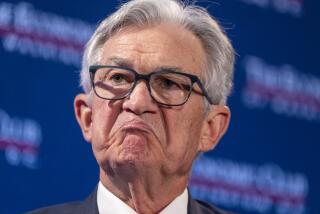Soviet Breakup May Help U.S. Investors
- Share via
The trouble with a lot of the expert analysis on the breakup of the Soviet Union is that it gives too much credit to bureaucracy and too little to the human spirit.
“It is feared that the Soviet republics could become economic basket cases,” say Washington foreign policy officials--as if 70 years of Moscow central planning hasn’t made them basket cases already. One could imagine such experts in 1776 condemning the American colonies for breaking away from the British empire.
But some savvy U.S. business people have a different view, especially after finding themselves visiting Moscow during the Aug. 19 coup and its collapse two days later. “A representative of the Russian Federation was brought through the barricades to meet with us at a banquet on Monday night,” reports Dennis Tito, president of Wilshire Associates, a Los Angeles-based pension fund consulting and investment firm. “That’s how intent the Soviets were in showing us they were serious about business.”
They’re capable as well as serious, says Dean LeBaron, head of Batterymarch Financial Management. One consequence of the breakup is that “reduction of political power allows for creation of individual economic power,” says LeBaron, whose Boston-based investment group manages $6.3 billion in pension assets worldwide.
LeBaron means that the revolution will allow managers of Soviet enterprises to get out from under the control of Communist Party bureaucrats and show their stuff. And he believes that spells investment opportunity.
So Batterymarch is trying to raise $250 million in U.S. pension investments for the Soviet Companies Fund. He has a team of employees--four Russian-speaking Americans with Harvard Business School educations and three Soviets--tracking down prospects in Moscow, Leningrad and Kiev.
The Batterymarch venture capitalists are studying giant Soviet state companies, such as Moscow Electric Tube Works and Chromatron, which make television tubes. No, they’re not interested in Soviet TV, which is about 15 years behind the West technologically. You don’t make much progress in communications in a country that taps telephones and bans fax machines.
But underneath the state-controlled rubble there may be technological know-how and energetic people who could produce an advanced product for world markets. If so, the Batterymarch venturers hope to form a joint stock company involving Soviet managers, U.S. pension fund money and global company equipment or know-how.
One of the first such companies may try to market a Soviet plane, about the size of a Boeing 737, from the Kiev Aircraft Production Assn. and Tupolev Design Bureau. The head of Kiev Aircraft, Anatoly Malashin, impressed the U.S. pension investors during their August visit. “He’s genuine, and he knows his stuff,” says Tito, an aerospace engineer who founded Wilshire 20 years ago to apply advanced mathematics to financial markets.
Corporate partnerships and joint ventures are an old subject in U.S.-Soviet relations. In the past, most never got beyond the talking stage. Even today, Soviet managers aren’t always attuned to what Western venture capitalists are looking for. “We want to see technology, and they want to show us how big their plant is,” Tito says.
But LeBaron believes that the future will be different. For one thing, he is working with the Soviet military’s Industrial Commission, which wants to covert defense production to commercial uses. “The military sector is stronger in managerial talent than any other sector in the economy,” LeBaron says.
He hopes ultimately to invest $500 million in U.S. pension money--a tiny amount of their $2 trillion in investable funds--along with $500 million worth of global company know-how or equipment, in a 12-year investment fund.
“The return would be zero to 20,000%,” Tito says. Of course, the risk is high, he says, but so is the possible return. “The time to invest in Germany and Japan was in the late 1940s, not in 1980,” Tito says. “Russia may be in the same position today.”
The idea is similar to venture funds in India or Latin America, or high technology in the United States: A small amount earning a high return adds nicely to the overall return of a giant fund with billions invested in conventional stocks and bonds.
But is it a good idea for the pensions of U.S. working people to be invested in helping Soviet military suppliers convert to civilian work? The question answers itself: If such investment discourages swords and encourages plowshares, it would be an answer to prayers.
In fact, if U.S. venture capitalists believe that there’s opportunity in the Soviet defense industry, they might also turn their eyes to U.S. defense companies, where highly useful commercial technology may lie buried under Pentagon secrecy. Offering opportunity to hard-pressed U.S. aerospace managers and engineers could yield a good return too.
Foreign policy experts may fear the breakup of the Soviet Union. But managers of Soviet enterprises and U.S. investments welcome it as launching a new era of opportunity.
Maybe the experts should follow the money.
More to Read
Inside the business of entertainment
The Wide Shot brings you news, analysis and insights on everything from streaming wars to production — and what it all means for the future.
You may occasionally receive promotional content from the Los Angeles Times.










